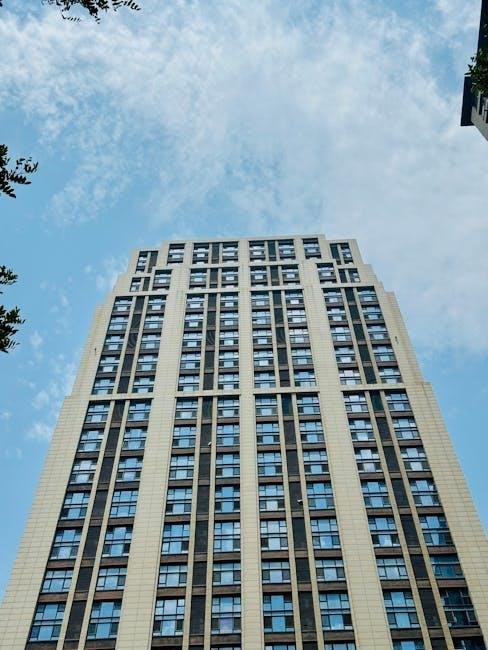Overview of the South Carolina Residential Landlord-Tenant Act
The South Carolina Residential Landlord-Tenant Act, enacted in 1986, outlines the rights and responsibilities of landlords and tenants in residential rental agreements. It covers key areas such as security deposits, eviction processes, lease terms, and essential services, providing a legal framework to ensure fairness and clarity in rental relationships.
Purpose and Scope of the Act
The South Carolina Residential Landlord-Tenant Act was enacted to balance the rights and duties of landlords and tenants in residential rental agreements. Its primary purpose is to establish a legal framework that ensures fairness, clarity, and protection for both parties. The Act applies to all residential rental properties, excluding certain types like hotels or transient occupancy. It aims to prevent disputes by clearly defining responsibilities, such as maintenance, security deposits, and eviction processes. Additionally, the Act ensures compliance with building codes and safety standards, protecting tenants’ health and well-being. By providing a structured approach to rental relationships, the Act promotes harmony and legal recourse for resolving conflicts, making it a vital resource for both landlords and tenants in South Carolina.
Key Provisions for Landlords and Tenants
The South Carolina Residential Landlord-Tenant Act outlines specific provisions to ensure a balanced relationship between landlords and tenants. Landlords are required to maintain the property, provide essential services like water and electricity, and comply with safety standards. Tenants must pay rent, maintain the rental unit, and comply with lease terms. The Act regulates security deposits, limiting the amount and requiring refunds within 30 days of tenancy termination. It also details eviction processes, ensuring landlords follow legal procedures. Both parties are encouraged to document agreements and communications to avoid disputes. By setting clear expectations, the Act promotes fairness and accountability, protecting the rights of all involved while fostering a positive rental environment. This framework is essential for resolving conflicts and ensuring compliance with state laws.
Key Components of the South Carolina Landlord-Tenant Act
The Act regulates security deposits, eviction procedures, lease agreements, and tenant responsibilities, ensuring clarity in rental relationships and protecting both parties’ rights under South Carolina law.
Security Deposits: Rules and Regulations
The South Carolina Residential Landlord-Tenant Act governs security deposits, limiting them to one month’s rent for unfurnished properties and two months’ for furnished ones. Landlords must provide an itemized list of deductions within 30 days of lease termination. Failure to comply may result in penalties, including return of the deposit plus damages. Deposits must be stored in a separate bank account or covered by a surety bond. This ensures transparency and protects tenants from unfair practices, aligning with the Act’s goal of balancing landlord and tenant rights. Proper handling of security deposits is crucial for both parties to maintain a lawful rental relationship.
Tenant Responsibilities Under the Act
Tenants in South Carolina are required to pay rent on time, maintain the property in a clean and safe condition, and comply with all lease terms. They must notify the landlord promptly of any needed repairs to prevent further damage. Tenants are also responsible for adhering to all applicable laws and regulations, ensuring their use of the property does not violate any ordinances. They must avoid intentional or negligent damage to the property and refrain from unauthorized modifications. Additionally, tenants must respect any restrictions on guests, pets, or other terms outlined in the lease agreement. Fulfilling these responsibilities helps maintain a positive landlord-tenant relationship and ensures compliance with the South Carolina Residential Landlord-Tenant Act.
Eviction Process and Legal Grounds
The South Carolina Residential Landlord-Tenant Act outlines specific legal grounds for eviction, including non-payment of rent, violation of lease terms, or illegal activities on the property. Landlords must provide tenants with written notice, such as a 5-day notice for non-payment or a 30-day notice for other breaches. If the tenant fails to remedy the issue or vacate, the landlord can file an eviction lawsuit in magistrate court. The court will review the case and may issue an eviction order if the landlord proves their case. Tenants have the right to contest the eviction in court, but landlords must strictly follow the legal process to avoid claims of improper eviction. Compliance with these procedures ensures both parties’ rights are protected under the Act.
Lease Agreements: Fixed-Term vs. Periodic Tenancies
The South Carolina Residential Landlord-Tenant Act distinguishes between fixed-term and periodic tenancies. Fixed-term leases specify a definite rental period, such as one year, and automatically expire at the end of the term unless renewed. Periodic tenancies, like month-to-month agreements, renew indefinitely until either party terminates the arrangement with proper notice. Fixed-term leases provide stability for both landlords and tenants, while periodic tenancies offer flexibility. The Act requires landlords to provide written lease agreements for fixed-term tenancies, ensuring clarity on terms and responsibilities. If no specific lease type is agreed upon, the tenancy defaults to a month-to-month arrangement. Understanding these distinctions is crucial for both parties to navigate their rental relationship effectively under the Act.

Landlord Obligations
Landlords must maintain rental properties in habitable condition, comply with building codes, and disclose required information to tenants, fulfilling legal duties under the Act.
Required Disclosures to Tenants
Under the South Carolina Residential Landlord-Tenant Act, landlords are required to disclose specific information to tenants. This includes the name and address of the property owner or manager, as well as any authorized agents. Additionally, landlords must inform tenants if the rental property is for sale and provide details about security deposits, including how they are handled and returned. Tenants must also be notified of any known defects or hazards on the property. These disclosures ensure transparency and protect tenants’ rights, fostering a fair rental relationship. Failure to comply with these requirements can result in legal consequences for landlords, emphasizing the importance of adhering to the Act’s guidelines.
Maintenance and Repairs: Landlord Duties
Under the South Carolina Residential Landlord-Tenant Act, landlords are obligated to maintain the rental property in a habitable condition. This includes ensuring all essential systems, such as electricity, plumbing, and heating, are functioning properly. Landlords must also keep common areas clean and safe, manage waste disposal, and address any structural issues that could pose a health or safety risk. Tenants are entitled to timely repairs for significant defects, and landlords must comply with local building codes. Failure to meet these obligations can lead to legal action, emphasizing the landlord’s responsibility to provide a safe and livable environment for tenants throughout the lease term.
Compliance with Building Codes and Safety Standards
The South Carolina Residential Landlord-Tenant Act mandates that landlords ensure rental properties comply with all applicable building codes and safety standards. This includes installing working smoke detectors, maintaining fire exits, and ensuring proper ventilation. Properties must be free from hazardous conditions such as lead paint or asbestos. Landlords are also required to keep electrical, plumbing, and heating systems up to code. Failure to comply can result in legal consequences, including fines or being held liable for injuries caused by unsafe conditions. Regular inspections may be necessary to verify compliance, ensuring a safe living environment for tenants and adherence to local and state regulations. This duty is non-transferable and cannot be waived by the tenant.

Tenant Rights and Protections
Tenants in South Carolina are entitled to essential services like water, electricity, and a habitable living environment. The Act protects tenants from illegal evictions and retaliatory actions by landlords, ensuring fair treatment and safe housing conditions.
Right to Essential Services (Water, Electricity, etc.)
Under the South Carolina Residential Landlord-Tenant Act, tenants are legally entitled to essential services such as running water, electricity, and functional plumbing. Landlords are required to ensure these services are provided and maintained to guarantee a habitable living environment. Failure to provide these necessities can be considered a breach of the rental agreement. Tenants have the right to report such issues and may pursue legal remedies if landlords neglect their obligations. This provision ensures tenants access to basic utilities, which are fundamental for health, safety, and comfort in their rental property. The Act emphasizes the landlord’s responsibility to maintain these services throughout the tenancy.
Protections Against Retaliatory Evictions
The South Carolina Residential Landlord-Tenant Act protects tenants from retaliatory evictions, ensuring landlords cannot evict tenants for exercising their legal rights. Tenants are shielded from eviction for actions such as reporting housing code violations, requesting necessary repairs, or withholding rent due to uninhabitable conditions. Landlords must have valid grounds, such as non-payment of rent or breach of lease terms, to initiate eviction proceedings; Retaliatory evictions are prohibited, and tenants can challenge such actions in court. This provision aims to safeguard tenants from unfair practices and ensure they can assert their rights without fear of retribution. The Act emphasizes the importance of maintaining a fair and balanced relationship between landlords and tenants.

Legal Resources and References
The South Carolina Residential Landlord-Tenant Act is codified in the South Carolina Code of Laws, Title 27, Chapter 40. Official PDF versions of the Act are available online, providing detailed legal frameworks and guidelines for both landlords and tenants. These resources outline the rights, obligations, and dispute resolution processes under the Act, ensuring compliance and understanding for all parties involved.
South Carolina Code of Laws: Title 27, Chapter 40
South Carolina Code of Laws, Title 27, Chapter 40, also known as the South Carolina Residential Landlord-Tenant Act, provides a comprehensive legal framework governing residential rental relationships. It outlines the rights and responsibilities of both landlords and tenants, covering essential aspects such as security deposits, eviction processes, lease agreements, and maintenance requirements. The Act ensures that both parties are aware of their obligations, fostering a fair and transparent rental environment. By referencing Title 27, Chapter 40, landlords and tenants can gain clarity on legal standards, dispute resolution, and compliance with state laws, promoting harmonious and legally sound rental interactions.
Official PDF and Online Resources for the Act
The official PDF of the South Carolina Residential Landlord-Tenant Act is available through the South Carolina Legislature website, providing a detailed and authoritative source for understanding the law. Online resources, such as the South Carolina Bar website, offer summaries, forms, and guides to help both landlords and tenants navigate the Act. These resources include explanations of key provisions, sample lease agreements, and step-by-step guides for processes like evictions and security deposit returns. Additionally, the South Carolina Code of Laws (Title 27, Chapter 40) can be accessed directly online, ensuring easy reference to the most up-to-date legal information. These official materials are essential for ensuring compliance and understanding rights and obligations under the Act.

Practical Advice for Landlords and Tenants
Read the South Carolina Residential Landlord-Tenant Act thoroughly to understand rights and obligations. Landlords should ensure compliance with maintenance and disclosure requirements, while tenants must fulfill rental terms and communicate issues promptly.
Understanding the Lease Agreement
A lease agreement is a legally binding contract outlining the terms between landlords and tenants. It should include details like rent, duration, and responsibilities. South Carolina law requires landlords to provide a written lease if the tenancy exceeds a year. Tenants should review the document carefully, ensuring all agreed terms are included. The lease must comply with the South Carolina Residential Landlord-Tenant Act, covering aspects like security deposits and eviction procedures. Both parties should retain a signed copy for their records. Understanding the lease ensures clarity and prevents disputes, fostering a harmonious landlord-tenant relationship.
Resolving Disputes Through Legal Channels
Disputes between landlords and tenants in South Carolina can often be resolved through legal channels. The South Carolina Residential Landlord-Tenant Act provides a framework for addressing issues like unpaid rent, property damage, or lease violations. Mediation is a common first step to resolve conflicts amicably. If mediation fails, either party may file a lawsuit in small claims court or magistrate court, depending on the claim amount. For evictions, landlords must follow specific legal procedures, including serving proper notices and filing eviction proceedings. Tenants also have legal recourse if landlords violate the Act, such as failing to provide essential services. Consulting an attorney is recommended to navigate the legal process effectively and ensure rights are protected.





